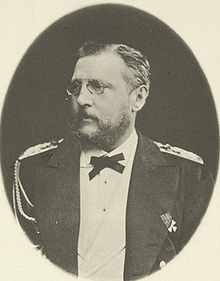Grand Duke Konstantin Nikolaevich
| Grand Duke Konstantin Nikolayevich | |||||
|---|---|---|---|---|---|
 |
|||||
| Born |
21 September 1827 Winter Palace, St. Petersburg, Russian Empire |
||||
| Died | 25 January 1892 (aged 64) Pavlovsk Palace, Pavlovsk, Russian Empire |
||||
| Burial | Grand Ducal Mausoleum, St. Petersburg, Russian Empire | ||||
| Spouse | Princess Alexandra of Saxe-Altenburg | ||||
| Issue ...and 5 illegitimate children |
Grand Duke Nicholas Constantinovich Olga, Queen of the Hellenes Grand Duchess Vera Constantinovna Grand Duke Constantine Constantinovich Grand Duke Dimitri Constantinovich Grand Duke Vyacheslav Constantinovich |
||||
|
|||||
| House | Romanov | ||||
| Father | Nicholas I of Russia | ||||
| Mother | Charlotte of Prussia | ||||
| Full name | |
|---|---|
| Konstantin Nikolayevich Romanov |
Grand Duke Konstantin Nikolayevich of Russia (Russian: Константи́н Никола́евич Рома́нов; 21 September 1827 – 25 January 1892) was the second son of Tsar Nicholas I of Russia and younger brother of Tsar Alexander II.
During the reign of Alexander II, Konstantin was an admiral of the Russian fleet and reformed the Russian Navy. He was also an instrumental figure in the emancipation of the serfs. He was less fortunate as viceroy of Poland (1862-1863) and had to be recalled to Russia where he was attacked for his liberalism.
After the assassination of his brother Alexander II in 1881, Konstantin fell from favour. The new tsar, Alexander III, his nephew, opposed Konstantin's liberal ideas and gradually stripped him of all his governmental positions. His retirement was marked with personal turmoil and family setbacks. After suffering a stroke, he spent his last years as an invalid.
Konstantin was born in St. Petersburg, the second son and fifth child of Tsar Nicholas I of Russia and Empress Alexandra Fyodorovna. His parents were happy to have a second son after nine years of having only daughters. Nicholas I and his wife were devoted to each other and to their children, providing an excellent education for them.
Normally the Imperial children were kept under female supervision until they were seven. However, by the time he was five Konstantin had become too willful and difficult for a governess to handle and his father appointed a male tutor for him. Nicholas I intended that Konstantin would eventually become Admiral General of the Russian Fleet and with this in mind chose Fyodor Litke as tutor for his son. Litke, who had circumnavigated the globe at the age of twenty, was a brash and bold man, unafraid of controversy or offense, and he passed these qualities along to his student. He trained the boy in naval sciences and filled his head with tales of the sea, gaining the friendship of his pupil for life. Languages were an important part of Konstantin's education; he learned Russian, English, German and French. As he grew older, his lessons increased in length and complexity to encompass mathematics, science, statistics, and government administration. There were also early military lessons and drills. Konstantin also enjoyed music, learning to play the piano and cello. He loved drawing and had great appreciation for the arts. He also became an enthusiastic reader and his fascination with Homer led him to translate the Odyssey from German.
...
Wikipedia
